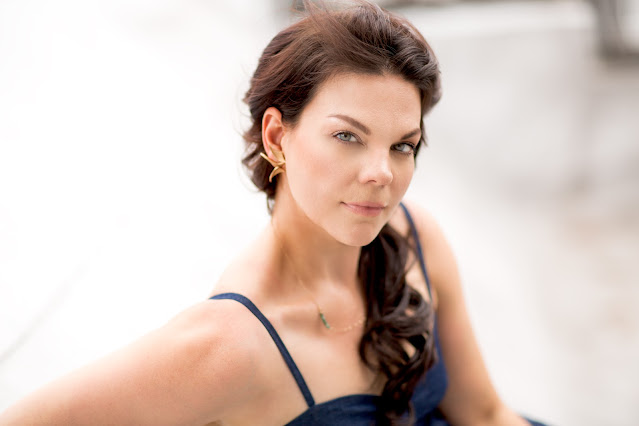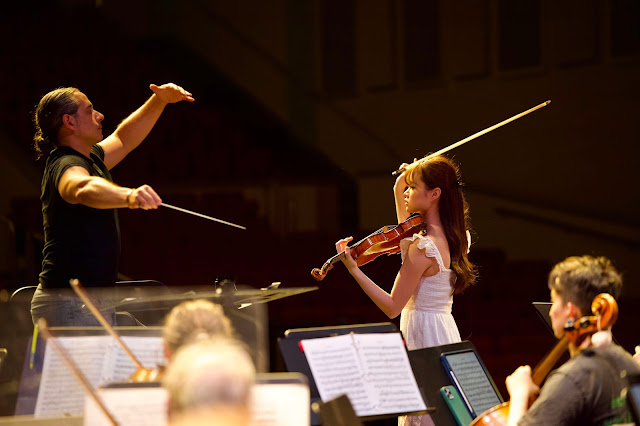I recently sat down with soprano Rena Harms to discuss her upcoming performance of Poulenc's Gloria which she will perform as our soloist with the Camellia Symphony Orchestra in Sacramento, together with the Sacramento City College Choirs. The performance is this Saturday, December 7, 2024, at 7:30pm. Below is our exchange:
Christian Baldini: Rena, it will be a pleasure to make music with you for the first time. Tell me, what are some of the moments you love the most about Poulenc's Gloria, and why? What should people listen for in this piece?
Rena Harms: I love Poulenc. The first full role I ever sang was Mere Marie in Poulenc’s Dialogues of the Carmelites in college. Poulenc has such a distinct sound and I love the moments in the Gloria that make me say “wow, that was so beautifully and quintessentially Poulenc.” I also love his use of dynamic contrast.CB: How were your beginnings with music? Who have been your most important mentors, and why?
RH: I grew up in a musical family and always knew I wanted to be a performer. I did my first play when I was 4 and acted, sang and danced all the way through high school. I went to Manhattan School of Music for my undergraduate degree and fell in love with opera. My most important mentor is Marilyn Horne. She has been my biggest advocate, hero and friend throughout my career. In my early career I was in the young artist program in LA and was hand picked by Placido Domingo. He definitely played a big role in my career as well. He conducted my first Mimi in La Boheme, which I jumped in for with no rehearsal on stage or in costume. It was a life changing experience!CB: Which composers inspire you the most? And which works suit your voice the best? Somewhat connected to this: how has your voice changed over time, and has that influenced your repertoire choices?
RH: I love to sing Verdi and Strauss the most. The way they wrote for the voice is unsurpassed. Puccini sings to my soul and is my favorite to perform. He writes ever emotion into the score. It is an actress’ paradise! I think my voice is especially suited for Czech composers but those operas are unfortunately not programmed so much so I have not gotten to sing some of my most coveted roles (Rusalka and Jenufa!) All voices mature and change but one of my biggest challenges in my early career was having to say not to things my teacher and Marilyn Horne thought were too soon. I said no to 5 Toscas before I was 25! I worked very hard in my career to say yes to things that I could sing with integrity in my voice.CB: You are both active in the concert stage, as well as the operatic world. What are some of the main differences in your view, and what are your personal preferences?
RH: The main difference for me is that in a concert you get to concentrate much more on the music because that is the totality of what is being asked of you.There is nothing I love more than singing a role in an opera, to tell a story and take an audience on a journey but there are so many other things going on that I find sometimes the importance of enjoying the beauty of the orchestra and voices can be forgotten. In a concert performance one gets to put all of the energy into the making music together.CB: Thank you for your time Rena, I look forward to bringing this beautiful music by Poulenc to life with you as our soloist!
RH: I can’t wait!
In the 2022-2023 season Ms. Harms made her role and company debut at Opera San José as the Stepmother in Alma Deustcher’s Cinderella, returning later in the season for Tosca. She also made a company debut as Nedda in I Pagliacci at the SP&O.
Ms. Harms’ “breathtaking intensity” (NDR Kultur) was on display in her recent French debut as Amelia in Simon Boccanegra at Opéra National de Bordeaux, and in her return to Florentine Opera for a role debut as Beatrice in Jake Heggie’s Three Decembers. She also reprised her interpretation of Donna Elvira in Mozart’s Don Giovanni at Opera Santa Barbara, a role she has performed in Milwaukee, Basel, and San Francisco. Her performance as Nell Gwynn in the regional premiere of Carlisle Floyd’s Prince of Players at Florentine Opera was recorded live for international release and received two Grammy nominations.
Ms. Harms recently joined the Seattle Symphony as the soprano soloist for Beethoven’s Symphony No. 9, the Seattle Chamber Music Festival and Opera America for their New Works Sampler, and Seattle Opera for Don Giovanni. She has appeared as Helmwige in Die Walküre and covered Freia at the Grand Théâtre de Genève, Desdemona in Otello with the Oldenburgishes Staatstheater, and as the title role in Sigfried Matthus’ Judith with Staatstheater Braunschweig and Kammeroper Schloss Rheinsberg. Additional credits include the Baden-Baden Festspielhaus covering Donna Elvira in Don Giovanni, Florentine Opera as Micaëla in Carmen and Liù in Turandot, and Fiordiligi in Così fan tutte for Staatstheater Braunschweig. She sang the title role of Fibich’s Sárka, Marenka in The Bartered Bride, and Contessa in Le nozze di Figaro, all in new productions with Staatstheater Braunschweig.
Ms. Harms made her English National Opera debut as Amelia in a new Dmitri Tcherniakov production of Simon Boccanegra and joined Theater Basel for Contessa in Le nozze di Figaro, Donna Elvira in Don Giovanni, the High Priestess in Calixto Bieito's Aida, and a Flower Maiden in Parsifal. In the U.S. performances include Micaëla in Carmen with Opera Santa Barbara and Opera Southwest as well as Fiordiligi in Così fan tutte, Helena in A Midsummer Night’s Dream, and Ericlea in Il ritorno d’Ulisse in patria with Wolf Trap Opera. She sang Mimì in La bohème with Los Angeles Opera, where she was a member of the company’s prestigious Domingo-Thornton Young Artist Program. With that same company, she sang Barena in Jenufa, Erste Magd in Der zerbrochene Krug and Zweite Magd in Der Zwerg in a double bill conducted by James Conlon and released on DVD, Sylvaine in The Merry Widow, as well as their Grammy Award-winning production of The Rise and Fall of the City of Mahagonny. Ms. Harms was a participant in San Francisco Opera’s Merola Opera Program and was a proud member of the apprentice artist program at Santa Fe Opera.
On the concert stage, Ms. Harms made her Mexican debut with Gustavo Dudamel conducting the Orquesta Sinfonica Simón Bolívar in a program of opera arias, and sang Strauss’ Vier letzte Lieder with the Burbank Philharmonic and Santa Fe Community Orchestra. She twice joined the Los Angeles Philharmonic for a series of concerts for children, and was the soprano soloist with Music Academy of the West for Barber’s Knoxville: Summer of 1915.
Ms. Harms is a Grand Finalist of the Metropolitan Opera National Council Auditions, winner of the Hennings-Fischer Foundation Competition, second prize winner of the Marcello Viotti International Vocal Competition.






.JPG)


